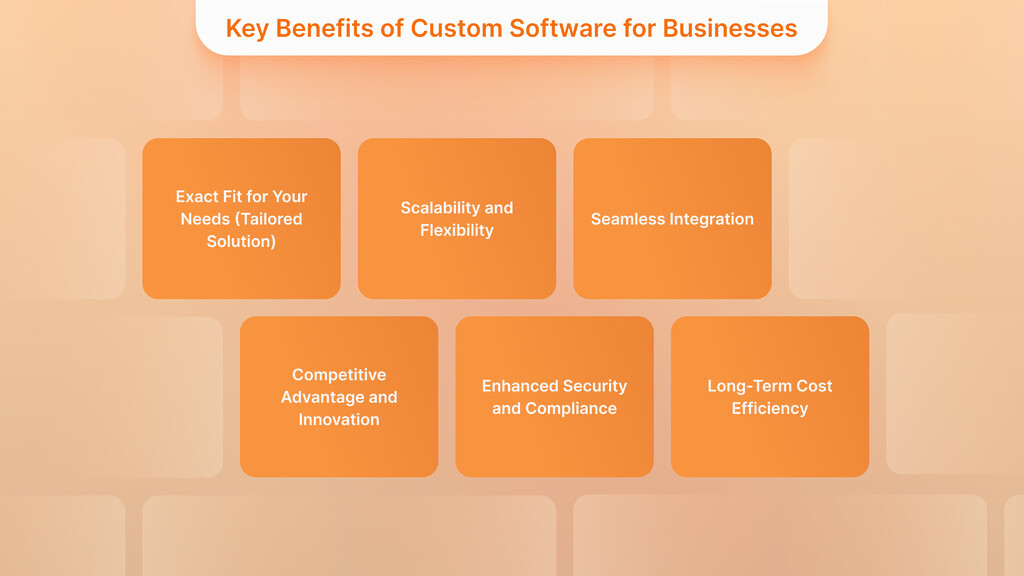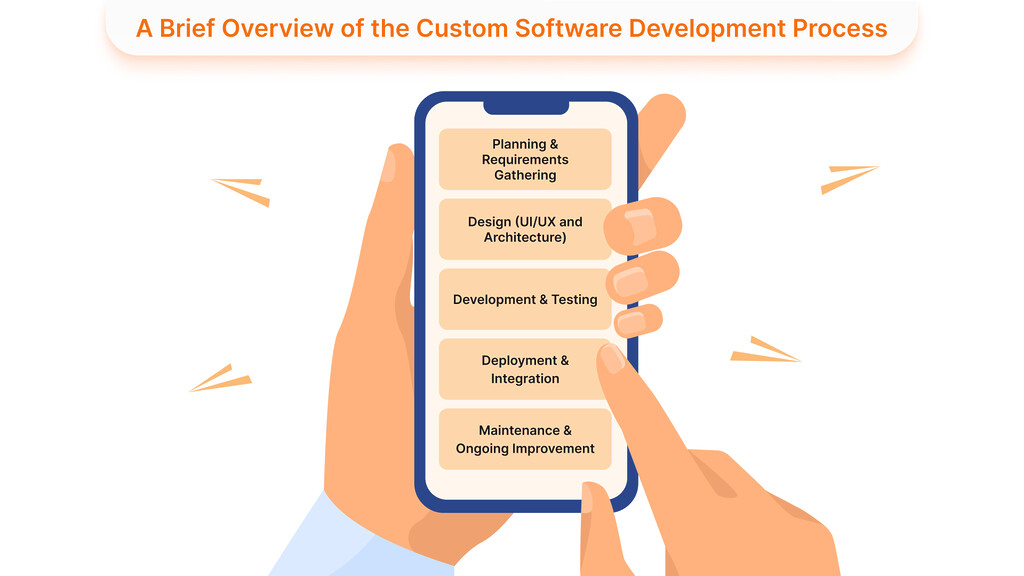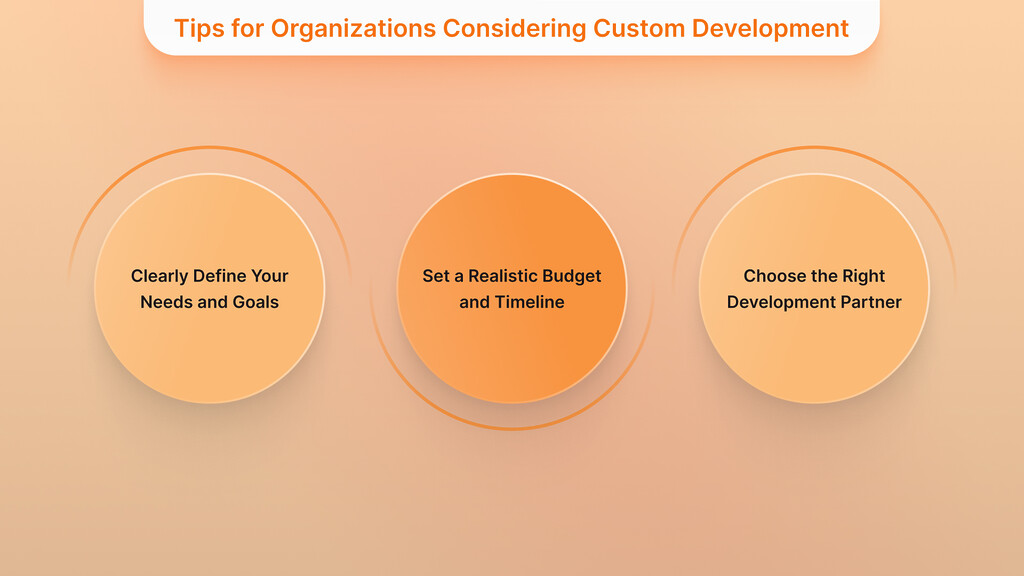Custom software development has become the go-to strategy for forward-thinking startups and enterprises that have outgrown one-size-fits-all applications. In a marketplace where 85 percent of organizations already rely on bespoke solutions, building software tailored to your exact processes is no longer a luxury—it’s a competitive necessity. This guide demystifies the practice, spotlighting the business-boosting advantages of custom builds, walking you through each phase of the Software Development Life Cycle, and sharing real-world examples and expert tips to help you launch a solution engineered for long-term growth.
Custom Software Development for a Competitive Edge
Build Unique Software Solutions with Our Expertise
Explore Custom SoftwareWhat Is Custom Software Development?
Custom software development means designing and implementing programs that precisely address the particular requirements of a single business entity or organization. Companies choose custom software development instead of purchasing standard commercial software, which many organizations utilize. They collaborate with developers to create original applications that suit their organizational needs perfectly. The customized approach starts with software design, followed by construction and deployment, until maintenance ensures ongoing service for the organization.
A custom suit represents the ideal approach when you avoid generic mass-produced clothing that fails to fit correctly. Similarly, custom software developers design their products to learn from the client rather than forcing the client into standardized solutions. The final product matches the business operation because it targets individual challenges while fulfilling specific organizational objectives. You will need additional time and financial resources to develop custom software, yet it will enhance your business processes while delivering higher efficiency and adapting to your organization’s growth.
Considering the available options on the market, the article Choosing Between Off-the-Shelf and Tailored Solutions presents a well-argued comparison that can guide your decision-making process.
Key Benefits of Custom Software for Businesses

The decision to develop customized software provides multiple benefits for entrepreneurs, startups, and established businesses. The following characteristics make custom solutions highly attractive for entrepreneurs and companies at every stage of development:
Exact Fit for Your Needs (Tailored Solution)
Custom software development creates a specific application that matches business workflows and requirements, resulting in improved efficiency and accurate work processes. Perfect software process alignment enables employees to finish their work more quickly while making fewer mistakes. Each feature within custom-made solutions exists because your business requires it, instead of because it comes with general-purpose application bundles. Such purpose-built functionality results in enhanced productivity as well as superior performance levels.
Scalability and Flexibility
Custom software maintains scalability, letting your company scale up or pivot its operations. Your business can extend its software functionality by adding new features or modules per your operational requirements. A custom application grows with your future needs, enabling it to maintain performance quality when handling rising user numbers or data amounts. Your custom software scales with your business growth, which means you never reach the limit of its capabilities because the system grows in parallel with your company expansion.
Explore how scalability impacts your bottom line in App Scalability in Custom Software Development.
Seamless Integration
Multiple business tools, including CRM, ERP, and marketing platforms, are standard within organizational systems. Software development teams create applications that blend tidily with current systems, so you achieve system-wide connectivity. A custom-built system stops the creation of isolated data groups while eliminating repetitive work. The customized solution links to your CRM and accounting software systems to transfer data automatically between them. Integrated systems improve accuracy levels by eliminating human data entry and establish one reliable data source for making decisions.
Competitive Advantage and Innovation
A custom application lets you create features that make your business stand out from competitors. Your strategic approach enables unique software development that allows you to add features and experiences that competitors do not have. Unique features derived from custom applications create two benefits: they help you stand out to customers or enhance their expertise, strengthening market competitiveness. Custom software enables organizations to achieve purposes that standard commercial packages would not support, which generates a long-lasting competitive advantage.
Enhanced Security and Compliance
The extensive use of standard commercial software programs makes hackers aware of the most frequently occurring system weaknesses. Custom software provides a more unpredictable target since it enables security engineering with tailored security features that match your organization’s requirements. Your software development should incorporate built-in encryption features together with authentication systems and standards compliance for relevant industries (e.g. HIPAA for healthcare or GDPR for user data) since day one. User-specific security implementation methods lower the possibility of breaches while safeguarding sensitive information. Businesses that require strict data protection through privacy measures often find that custom development offers sufficient reason to build their own software system.
Long-Term Cost Efficiency
The initial investment for a unique solution costs more but results in financial advantages throughout the operation. Third-party software licensing costs remain nonexistent, while unused program features do not incur additional expenses. Through workflow automation improvements and process automation, organizations can achieve efficient cost savings, which reduce labor expenses and minimize errors over the long term. Custom software development enables businesses to achieve substantial return on investment by streamlining manual processes while avoiding facility costs related to workarounds and needing to replace insufficient commercial software tools. The current investment enables money savings in the future.
Every benefit strengthens business operations and enhances business agility. Custom software selection offers a range of advantages, including specific functionality design, flexibility for growth and integration capabilities, security, local support teams, and business control.
Begin Your Digital Transformation Journey
Customized Strategies to Lead Your Business into the Digital Age
Explore Digital TransformationFor a deeper understanding of the strategic benefits, the Ultimate Guide to Hiring Custom Software Developers offers valuable insights into aligning development efforts with business goals.
A Brief Overview of the Custom Software Development Process

What steps determine the transformation of an excellent concept into operational custom software? The standard custom development practice implements specific phases called the Software Development Life Cycle (SDLC). The systematic process directs developers to plan software before creating it and testing it through the implementation and maintenance phases. The different project development approaches (Agile, Waterfall, and more) share these core stages for custom software development:
Planning & Requirements Gathering
Your team of development members starts by identifying all necessary requirements. The first step requires defining the software problems, identifying the end-users, and specifying necessary features and capabilities. The requirements gathering process includes examining your existing workflows and meeting stakeholders to produce specific project goals. A robust planning phase helps code developers understand the business targets and all expectations before writing code.
Design (UI/UX and Architecture)
Next comes designing the solution. Software developers and designers build the system’s technical structure, referred to as software architecture, and the visual layouts for the user interface (UI) and user experience (UX). The application framework and visual prototype take shape in this development stage. The design must be excellent because it ensures user-friendly operations and compliance with requirements. The blueprint must demonstrate complete solidity regarding technology selection (database and platforms), user interface, and experience understanding.
Invest in Professional UX/UI Design to Create Impactful Interfaces
Designing Seamless User Journeys That Boost Interaction and Conversion Rates
Discover UI/UX DesignThe article Choosing Between Responsive and Adaptive Design for Optimal Web Performance explains more about design strategies for better user experiences.
Development & Testing
The development team commences code-writing after acquiring design approval to create the software. During this core building segment, developers execute all features while integrating different systems and building operational capabilities according to established requirements. The work is divided into separate developmental stages called iterations and sprints, allowing you to monitor the progress in individual sections. Quality assurance professionals use testing procedures on newly developed features to find program errors and validate system functionality. The testing activities consist of unit, integration, performance, and user acceptance tests. Software development with testing runs in successive cycles to create fully functional and stable software.
Deployment & Integration
After successful testing, the software gets deployed to the live environment on servers or cloud-based systems for users to access it. The deployment method includes a one-time release, which may happen through multiple phases. The custom software receives integration with all essential existing systems and databases at this stage. The development team is responsible for the correct data transfer and smooth software integration into your IT framework. Here, the planning concepts and programming work transform into actual operational functionality, which users can access in their real-world environment.
Maintenance & Ongoing Improvement
Launch marks the beginning of continued work for the process. The ongoing maintenance phase involves developers who monitor performance, solve problems, and update software according to changing requirements and new improvement opportunities. Custom software functions as a dynamic product because you maintain complete control to incorporate new features, optimize functionalities, and adapt to current technological advancements and business needs. Your organization benefits from secure and up-to-date software through sustained support, making the application valuable throughout its extended operational lifespan.
All stages of development work under collaborative principles. Business owners and IT managers usually participate in decision-making activities throughout development stages, from requirements evaluation to prototype testing and initial version assessment. A reliable custom software development company will direct your project through all steps while maintaining open lines of communication to keep your objectives consistent throughout development.
Real-World Examples of Custom Software Solutions
Developing custom software appears complex at first glance, but several practical examples show exactly how made-to-order solutions benefit actual operations. Multiple businesses from different sectors have created custom applications to meet their unique challenges.
Logistics and Operations
A logistics or delivery company should create its own package tracking solution that provides complete automation throughout its operations. The courier company built its dedicated tracking system, which delivered real-time delivery management and automated shipment tracking that prevented human errors. The company experienced faster delivery processing and reduced operational expenses through this development. The company developed this operational software to meet its exact processes, streamlining dispatch and delivery confirmation.
Retail and Customer Experience
The retail industry implements strategies to boost customer involvement in their operations. The retailer designed a special personalized shopping application as their proprietary solution to enhance client retention and revenue generation. The application analyzes user purchase history together with browsing data to suggest individual products and promotional deals. Customer satisfaction improved simultaneously with decreased customer attrition through personalized product recommendations that produced seamless shopping experiences. The retailer gained specific loyalty features, development capabilities, and inventory integration opportunities that other standard e-commerce platforms do not provide through their customized application.
Finance and Data Management
Financial sector businesses depend absolutely on precise data and full compliance. The financial services company created customized software that consolidated data and created an automated reporting capability. The system obtains data from sales, accounting, and investment departments before creating instant, detailed reports and dashboards. Staff’s time-consuming spreadsheet compilation efforts became obsolete since the system saved extensive hours, allowing accurate forecasting and simple regulatory compliance. The company improved its data insights and reduced critical calculation errors by making software adjustments that matched its business requirements and regulatory needs.
Individuation software addresses particular requirements, including transportation activity follow-up, point-of-sale adjustment, and financial statement record-keeping. The software implemented in each situation transformed the organization by delivering capabilities that generic solutions either did not support or performed poorly. Custom solutions, which include mobile apps, web platforms, and internal tools, give businesses the competitive edge they need to succeed.
Tips for Organizations Considering Custom Development

A strategic method leads to successful outcomes for anyone considering a custom software investment. Below are a few practical tips for entrepreneurs and IT decision-makers before you dive into a custom software development project:
Clearly Define Your Needs and Goals
Your first step should involve developing complete clarity regarding the issues your software will address while defining its expected results. Assess the following questions to determine what particular obstacle this software needs to handle: What specific challenge will this software address? Which processes should it improve or automate? What are the “must-have” features versus nice-to-haves?. Identifying the absolute requirements from desirable features is essential for developers to maintain project focus because documentation tracks every requirement and objective. When a development team clearly understands the project vision, it will create a successful product.
Set a Realistic Budget and Timeline
Custom software development requires considerable investment of time and financial resources, which you should acknowledge beforehand. Define your funding limits, then allocate sufficient time for complete development alongside testing activities. You cannot build sophisticated, high-quality software cheaply or quickly during a brief time, since premium applications require adequate resources. Add additional funding to your budget to accommodate the normal process of adjusting features as the development progresses. Your project gets off to a better start when you consult your developers about your budget and timeline expectations, thus establishing feasibility.
Choose the Right Development Partner
Working with an in-house development team with enough capacity and the required skills is sometimes impossible, so you must collaborate with custom software development companies. Take thorough steps when picking your technology partner company. Seek development teams that demonstrate expertise in the technologies you need and prove their ability to deliver successful projects within your industry or deal with similar business needs. Request to see their past deliverables together with client references. A software project achieves the same value that its development team possesses.
A superior development partner dedicates effort to business understanding alongside thorough communication and devotes themselves to tackling your issues beyond code development tasks. Challenge your potential development partner with questions about their development practices, support services following market release, and methods to maintain the highest quality standards. You will make your most vital project decision by selecting a trustworthy partner capable of professional work. The article on Dedicated Development Teams discusses how team structure can support secure and efficient development.
Experience Our Skilled Development Teams
Elevate Your Projects with Skilled Software Development Professionals
Get Your Development TeamUnderstanding your requirements and budget planning, combined with using the correct professional assistance, will enhance the probability of your custom software project’s success. The initial investment in proper planning and clear communication will significantly save time and financial resources.
Your Journey Starts with Custom Software Development
When it comes to strategic technology alignment, custom software development proved to be an effective methodology. The process involves creating application software that perfectly adapts to your business needs to make your operations more efficient and to make unique customer value delivery possible. The analysis of the definition and advantages of custom solutions demonstrates their ability to fulfill needs that standard off-the-shelf software does not support.
Business leaders among startup founders and IT managers should view custom development services as an option when standard software solutions fail to meet their unique requirements or new business concepts. Custom development provides organizations with operational efficiency alongside superior user experiences and extended growth horizons that make the cost beneficial. Make your custom development focus by outlining your objectives, budgeting your resources, and selecting an experienced development team or company that grasps your initiative.
Technology is the main factor defining competitive advantages in modern business environments. Your business will gain momentum through robust software solutions developed through custom software development, either conducted internally or contracted from custom software development companies. Custom software represents a business investment that lets you design exactly what you require to achieve your goals and rapidly adapt to changes in those objectives. The correct implementation of your custom-built software will propel your organization toward future achievements.
Are you ready to invest in a solution built just for you?
Let’s discuss your business goals and how our team can develop a customized software solution that supports your success. Contact us and get your project moving!










